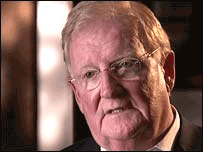 Great change is often a matter of small actions, constant conversation and doing the right thing. In this case, it is also the stuff of heroes.
Great change is often a matter of small actions, constant conversation and doing the right thing. In this case, it is also the stuff of heroes.The documentary The Secret Peacemaker, broadcast on BBC2 last night, was one of the most moving things I have seen for a long time. It was the story of a businessman called Brendan Duddy, who lives in Derry in Northern Ireland.
He isn't, by the normal ways of looking at things, anyone special. He was an ordinary man who owned a chip shop. But what he did was amazing.
A republican and a pacifist, Brendan acted as the broker to facilitate dialogue between the IRA and the British Government for more than twenty years during the 70's, 80's and early 90's, the darkest time of the Troubles.
He set up meetings at his house and elsewhere to get representatives of the IRA and the British Government together, during times when neither side could be seen to be talking to each other. He did so at immense personal risk to himself and his family. In Northern Ireland at this time, to be seen talking to a British soldier could get you shot by IRA paramilitaries paranoid about 'touts' or informers. Loyalist paramilitaries were shooting catholics seemingly at random. Being seen with militant republicans could have you thrown in jail indefinitely without trial.
There was nothing in it for Brendan, except the belief that dialogue was better than killing, and that the killing had to stop.
For twenty years, he spoke in coded messages on bugged telephone lines, drove through the dark to anonymous houses to convey messages to men who were ordering murders by the day, and kept it all secret from his friends and neighbours - everyone except his family.
He brokered meetings in his house, making cups of tea for killers and intelligence agents sitting on his sofa, being a trusted witness to conversations where the politically unthinkable was discussed and deals were done - ceasefires, doors kept open, promises made - that paved the way to the Good Friday agreement and the brittle but enduring peace that exists in Northern Ireland today.
I am sure that the story I saw had been cleaned up, sanitised and edited nicely - and that the truth is more ambiguous, murky and uncomfortable than the version broadcast. But regardless of what we learn in the future I have no doubt that this man is a hero of the highest order.
He did the right thing when it would have been easier to put his head in the sand. He risked everything he had to make things better, when there was no realistic prospect of success for years. And he did it effectively alone - not working for anyone else, not following anyone else's policy - but because he personally saw that something needed to be done and he could do it.
I grew up in Northern Ireland during the Troubles - and because I know how bleak those days were, I have nothing but admiration for this man who tried, in small steps over many years, to work to end them.
And, at the risk of sounding crass, I think Brendan can teach us something about change. First of all, the primary driver of peace process was conversation - dialogue between people - not 'communication' formally issued. Indeed the main time things went wrong for him was when some information was released the wrong way - announced in the House of Commons - rather than in discussion.
Secondly, if you want change to happen, it is much better to get out there and do something, rather than wait, even if you don't know every step of the journey. Brendan facilitated the dialogue, often when neither party was clear about what they were to talk about. Doing something and getting the dialogue going was critical.
And finally, change is about having a compass, not a map. Brendan was a pacifist - he wanted the killing to stop. He didn't have a great plan for peace, he just knew that if he could put the relevant people together, then the killing became less likely. It was a move in the right direction and that was the right thing to do.
Now the changes we have to face in our companies are much less mortal, are more defined and are much simpler than the things Brendan faced. But his example, I think, is something from which we can all learn.
- Mike







